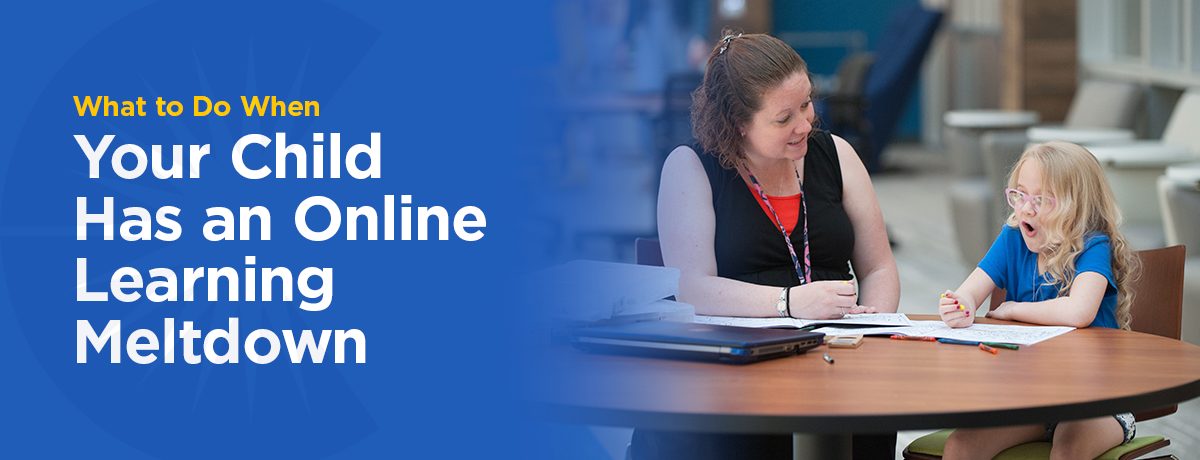Enrollment Now Open for Second Semester. Click Here
Enrollment Now Open for Second Semester. Click Here

Tantrums can be frustrating for kids and parents alike and often occur because of intense emotions about a situation. For example, student meltdowns were often common during the COVID-19 pandemic when online schooling forced many children to socially distance. Even when children expect and enjoy doing schoolwork online, there can still be times when kids become overwhelmed and have a meltdown over online learning.
Let’s discover why kids experience temper tantrums so you can learn how to help your child navigate an online learning meltdown and get them back to growing and having fun in the virtual classroom.
Why do tantrums happen? Parents may view tantrums as just a frustration or inconvenience, yet there is a lot to learn about your child from a meltdown. Some core reasons children have tantrums include:
Kids may be frustrated because they are uncomfortable, tired, or hungry. Kids could also have a tantrum when they want their parent or a toy to act in a certain way. It takes time for young children to understand that they cannot always manipulate others into doing what they want.
Because tantrums usually occur in children ages 1 to 3, they are often a way for kids to express the emotions they don’t yet know how to name. A tantrum may be the only way your little one can deal with sadness and anger.
A desire for more independence can also lead to meltdowns. When they can’t get what they want, like a snack or toy, or do what they wish to, toddlers may resort to having a meltdown.
Although tantrums primarily occur among younger children, older school-age kids can also have them. Here are a few of the most common reasons why student meltdowns occur:
Students sometimes have meltdowns because of complex assignments in school. If course material is particularly challenging or the child feels behind their classmates, they could turn to a tantrum to express their frustration.
Sometimes students need help on an assignment but are too afraid to ask, or think finding solutions on their own will take too much time. Whatever the reason, students often don’t know how to de-escalate their feelings when they need help.
According to the Sleep Foundation, sleep directly affects mood and happiness, impacts a child’s ability to pay attention, and influences academic performance. If kids are having tantrums during or because of school, poor sleep could be the culprit.
Perfectionism is emotionally draining. Kids might feel like they need to achieve specific grades to be successful, please their parents, or feel proud of themselves. Kids might not know healthy ways to cope with getting a grade they didn’t want.
Helping your kids interpret and process their emotions to become emotionally resilient is an important part of parenting. You can give your child the tools to face challenges later on by helping them work through tantrums. Follow these tips on what to do when your child has a meltdown:
Intense emotions can be difficult for children of all ages to express. Identifying those feelings in your child can help you determine strategies for helping your child work through them.
When a student has a meltdown during school hours, it can easily disrupt their entire day. Sometimes their emotions distract them from their schoolwork and make it difficult to accomplish anything. It can be beneficial to allow your child a break from schoolwork to decompress.
It’s much easier to help your child return to calm when you can take all the time you need and step away from the screen. Commonwealth Charter Academy (CCA) provides flexible schedules so students can work at their own pace through their virtual learning curricula. Our personalized learning program is adaptable, so you can tailor your child’s schedule to their unique needs and help them learn at their best pace.
A lack of sleep is a major cause of child tantrums and meltdown behavior. An inadequate amount of sleep can impact your child’s mental health and cause anxiety and mood swings. Here are some common causes of sleep deprivation in students:
Sometimes the best way to help your child during a meltdown is to give them a space where they can retreat and self-regulate their emotions in seclusion. A special corner can help your child control their feelings in an area that makes them feel safe. You can fill their space with objects and images that bring your child peace, like:
While reasoning with a toddler about why they should stop having a meltdown may not always work, parents can talk to their child in other ways to help them regain control:
As a cyber charter school, CCA makes a conscious effort to provide flexible, personalized learning for all students K-12. We create a safe and dynamic learning environment and dedicated support to help your child excel in their individual goals. We understand each child has unique needs, so we created a flexible program where kids can learn at their own pace and pursue other opportunities like extracurricular activities and hobbies.
Contact us today and learn why parents choose CCA as their public cyber charter school.
Enrollment Now Open for Second Semester. Click Here